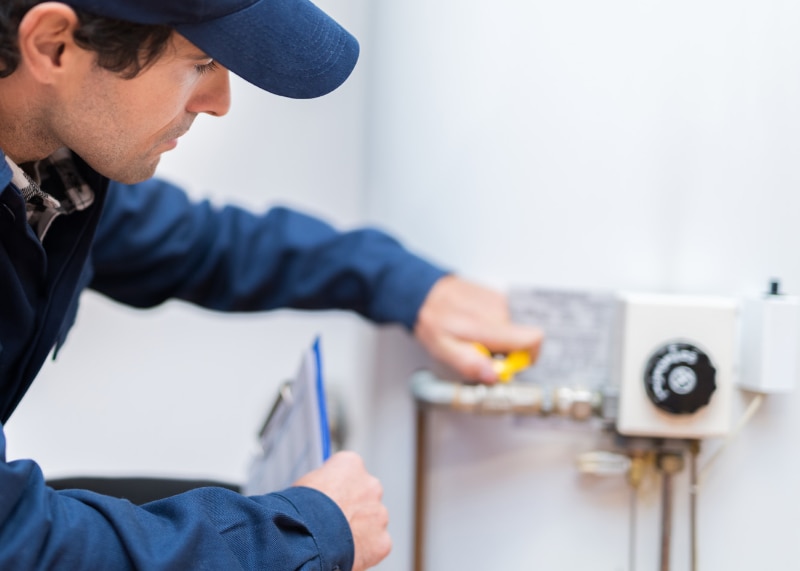Your Basics Of Water Heater Issues
Your Basics Of Water Heater Issues
Blog Article
We have unearthed the article relating to Water Heaters Problems listed below on the net and felt it made sense to share it with you in this article.

Picture beginning your day without your regular warm shower. That currently establishes a bad tone for the rest of your day.
Every house needs a reliable water heater, but just a couple of recognize exactly how to handle one. One easy means to maintain your water heater in leading form is to check for mistakes consistently as well as fix them as quickly as they appear.
Bear in mind to shut off your water heater prior to sniffing about for mistakes. These are the water heater faults you are most likely to experience.
Water as well hot or as well cold
Every water heater has a thermostat that determines exactly how warm the water gets. If the water entering your residence is too hot regardless of setting a practical optimum temperature level, your thermostat might be damaged.
On the other hand, too cold water might be because of a fallen short thermostat, a damaged circuit, or improper gas flow. For instance, if you utilize a gas water heater with a busted pilot burner, you would obtain cold water, even if the thermostat is in ideal condition. For electric heaters, a blown fuse may be the wrongdoer.
Not enough warm water
Water heaters been available in lots of sizes, depending upon your hot water demands. If you lack warm water prior to every person has had a bath, your hot water heater is as well tiny for your family size. You must think about mounting a larger hot water heater storage tank or opting for a tankless hot water heater, which occupies less room and is a lot more durable.
Odd sounds
There are at the very least 5 kinds of noises you can learn through a water heater, but the most usual analysis is that it's time for the water heater to retire.
To start with, you must know with the normal sounds a water heater makes. An electric heating unit may seem different from a gas-powered one.
Popping or banging audios usually indicate there is a piece of sediment in your tanks, and also it's time to cleanse it out. On the other hand, whistling or hissing noises might simply be your valves letting some pressure off.
Water leakages
Leakages can originate from pipes, water links, shutoffs, or in the worst-case scenario, the storage tank itself. Over time, water will rust the storage tank, and discover its escape. If this occurs, you need to change your hot water heater as soon as possible.
However, prior to your modification your entire tank, make certain that all pipes remain in location which each valve functions flawlessly. If you still need help recognizing a leak, call your plumber.
Rust-colored water
Rust-colored water indicates among your water heater elements is worn away. Maybe the anode rod, or the storage tank itself. Your plumber will certainly be able to recognize which it is.
Lukewarm water
Despite how high you set the thermostat, you won't get any type of hot water out of a heating unit well past its prime. A hot water heater's performance might minimize with time.
You will certainly likewise get lukewarm water if your pipes have a cross connection. This means that when you turn on a faucet, warm water from the heating unit flows in along with routine, cold water. A cross link is easy to spot. If your hot water faucets still follow shutting the water heater shutoffs, you have a cross link.
Discoloured Water
Rust is a major cause of filthy or discoloured water. Deterioration within the water container or a failing anode rod can trigger this discolouration. The anode pole secures the container from rusting on the within and should be examined annual. Without a rod or an appropriately operating anode pole, the hot water promptly wears away inside the storage tank. Contact a specialist water heater professional to identify if changing the anode rod will fix the trouble; if not, change your water heater.
Final thought
Preferably, your hot water heater can last one decade prior to you require an adjustment. Nonetheless, after the 10-year mark, you might experience any one of these faults much more on a regular basis. Now, you must include a brand-new water heater to your spending plan.
How To Troubleshoot 3 Common Water Heater Problems in Twin Cities
The Water Heater Is Leaking
A leaky cold water inlet valve A loose pipe fitting A leaky temperature and pressure relief valve A corroded anode rod A cracked tank Turn Off Your Water Heater:
Shut off your gas water heater by turning the gas valve on the unit to the “OFF” position. Shut off your electric water by switching its power off at your electrical panel. Look for a two-pole breaker labeled “water heater” and turn it to the “OFF” position. Move the ball valve connected to the water heater to be perpendicular to the piping at a 90° angle. Look for the Leak:
Depending on whether the water is coming from the tank's top or bottom, you’ll want to look for the leak in different locations.
If the leak comes from the top of the tank, carefully look for water escaping from the cold water inlet valve or loose pipe fittings. Rusted hot and cold water valves can have loose connections with the tank, with water leaking out of them.
https://mspplumbingheatingair.com/blog/how-to-troubleshoot-3-common-water-heater-problems
We were made aware of that editorial about Water Heaters Problems through a friend on another web page. Sharing is good. You just don't know, you may just be doing someone a favor. I take joy in reading our article about Common Problems with Tank Water Heaters.
Give Me A Quote! Report this page